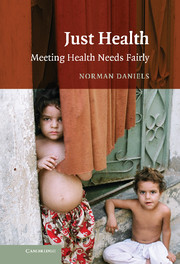6 - Global Aging and Intergenerational Equity
Published online by Cambridge University Press: 05 June 2012
Summary
Is the opportunity-based account of just health that I have defended age biased? It might seem so if we think that the opportunities of the elderly are in their past. Isn't it the young, after all, who talk about and care about their opportunities? If opportunity is less important to the elderly, and if health is important because of its impact on opportunity, we should care less about the health and health care of the elderly than we do about the health of the young. In fact, however, most developed countries spend three to four times as much money meeting the greater health needs of the elderly as they do on the young.
In Just Health Care and Am I My Parents' Keeper? (1988), a later book devoted exclusively to this issue, I responded by reasoning that this objection to my view rested on a misconception of the problem of justice between age groups. Specifically, I rejected the perception of the age-group problem as a problem of competition between groups viewed at a moment in time. I adopted instead a lifespan approach. We should allocate resources prudently to protect health and thus opportunity at each stage of our lives. The basic idea is that, since we all age, we should take as a model for what is fair between age groups what it is prudent for us to do for ourselves at each stage of life.
- Type
- Chapter
- Information
- Just HealthMeeting Health Needs Fairly, pp. 161 - 190Publisher: Cambridge University PressPrint publication year: 2007
- 1
- Cited by



